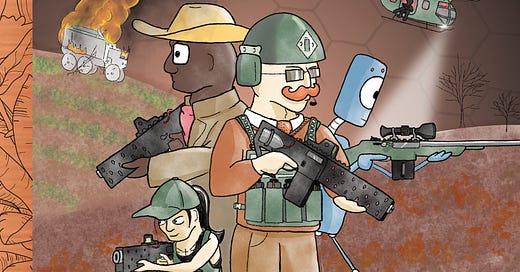My bio notes that my biggest project is not Substack, it’s creating children’s books. My newest title is out today and I’m excited to share it.
Even if you’re not in the market for kid’s books, the thinking behind it (naturally) has a lot in common with the themes I’ve posted on so far: culture, independence, and technological optimism. I’ll share that thinking here.
This has been my biggest project to date, taking me over two years to complete, so I’ve had lots of time to think (or overthink) how every aspect of the book supports these themes.
PROFESSOR COPPER’S TACTICAL PRIMER
The book itself is a basic instruction manual for small-unit gunfighting.
The tactics are focused on the things that could be useful for the kinds of games kids play: Nerf, paintball, airsoft, etc. I am not a tactical expert and have never carried a gun professionally. I am a desk jockey, not a soldier or a cop. But I’ve played a lot of these games and consulted with friends who have professional training in these areas to make sure I got it right. Everything in the book is applicable to real life too.
Most of my kid’s books are books I want to give my kids, but that I don’t see on the market. This one was no different. I want to raise my kids with a basic competency in martial spheres. They take karate and they recite the Four Rules of Gun Safety before they play with their water guns. My hope is that this book will help them take those skills to the next level as they grow.
Pre-launch reviewer Morgthorak the Undead has a pretty good breakdown of the academic content if you’re interested in more detail:
That academic content is wrapped in illustrations and a story. After all, most kids probably aren’t going to stick it out through, say, the Ranger Field Manual. Those manuals are dry, even for adults.
The basic story supporting the tactical content is of Martian colonists repelling an attack by aliens that live underground. It’s an old frontier story retold on the “final frontier” of space exploration.
It almost goes without saying that there is some technological optimism implied in a Martian farming colony, but even beyond that basic technological optisim is an optimism that traditional American values will accompany us into the stars. Nat and Su own their farm, implying some kind of private property rights. The force assembled to repel the attack is the colony militia, replete with their own arms and an infusion of civilial martial competency. They are aided and organized by a professional militiaman, Captain Gaspee.
The character choices were also intentional. In addition to capitalist ranchers, the milita team is led by a Professor. For someone whose most-popular post to date was mocking the “experts,” this may seem like an odd choice. But again, this is optimistic. True education and apolitical pursuit of truth are critical functions for a civilization. I hope that academia can recover these virtues. It may require some creative destruction, but if we are ever going to get to Mars, we will need scientists who can connect their work to real-life outcomes.
The Professor’s robot assistant is also an intentional choice. AI and robotics are coming. I hope that humanity retains its primacy, so the robot is in a supporting role.
Even more meta than all of that is the optimism that these traits still exist or are still recoverable in the next generation. Can a generation raised on soy protein isolate and six-shooterless Yosemite Sam cartoons summon the menace to deter total tyranny? Can the next generation of academics produce something more Indiana Jones and less Tony Fauci? To some degree, it will be up to them. But it will help if those of us who want to see the next generation empowered provide them with tools.
This book is my contribution to the toolkit.
—
You can find it on my website here or at Amazon. Check out an unpaid early review here.





